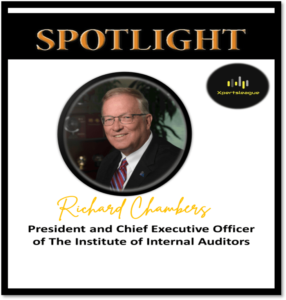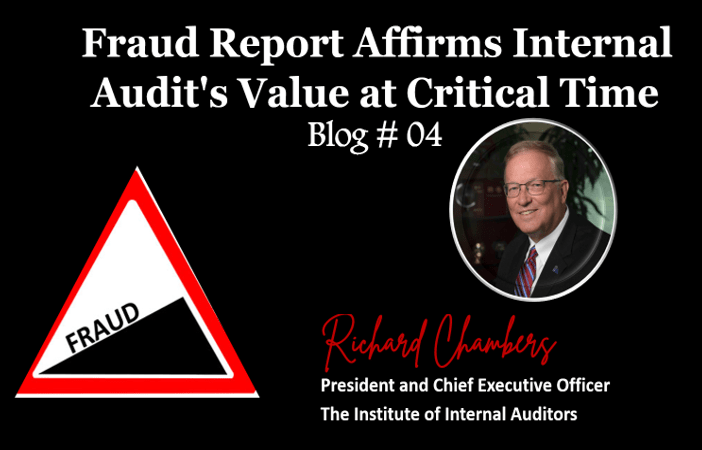10 Most-read Blog Posts of 2020 About “Internal Auditors” From Mr. Richard Chambers
Fraud Report Affirms Internal Audit’s Value at Critical Time
By Richard Chambers, President and Chief Executive Officer of The Institute of Internal Auditors
Each year, the Association of Certified Fraud Examiners (ACFE) publishes a Report to the Nations, which shares results of its annual Global Fraud Survey. The findings reflect the significant role that internal audit plays, and the value it adds, in detecting and deterring fraud. Indeed, internal audit consistently ranks second only to whistleblower tips as the most effective way to uncover wrongdoing.
2020 year’s report is no different, except in one very important way: Its message about internal audit’s value is needed now more than ever.
In addition to its deeply serious health implications, COVID-19 is part of any and every discussion about business and society. From its dramatic impact on global economic engines and its spawning of a telecommuting revolution, to the growing anxiety brought on by social distancing’s isolation, the pandemic dominates every waking hour.
And so it is with Occupational fraud.
The pandemic is creating conditions where occupational fraud can thrive. Anyone with the slightest understanding of fraud is familiar with the concept of the fraud triangle, which identifies pressure, opportunity, and rationalization as the key ingredients. The pandemic is fueling the first — pressure — in myriad ways, as its impact on economies threatens the financial well-being of millions of organizations and billions of workers globally.
The second, opportunity, could easily expand as organizations scramble to cut costs, even at the expense of effective controls. ACFE President and CEO Bruce Dorris describes the dangers behind this faulty thinking perfectly in the news release announcing the report, Coronavirus Pandemic Is a Perfect Storm for Fraud.
“Companies seeking to cut costs often target non-revenue-generating departments like compliance and internal audit. This is a mistake. Cutbacks to departments or initiatives that are integral to a comprehensive anti-fraud program only serve to leave organizations more vulnerable to the growing likelihood of fraud. As organizations make cuts in the attempt to operate with a leaner staff, they can find themselves caught in a perfect storm for fraud: Pressures motivating employee fraud are high at the same time that defenses intended to safeguard against fraud have been weakened.”
ACFE is not alone in recognizing the growing threat of fraud and corruption created by the pandemic. The Council of Europe’s Group of States Against Corruption (GRECO) has issued a similar warning. In a report published April 15, GRECO President Marin Mrčela cautioned:
“As countries face undeniable emergencies, concentration of powers, derogations from fundamental rights and freedoms, and as large amounts of money are infused into the economy to alleviate the crisis (now and in the near future), corruption risks should not be underestimated. It is therefore most important that anti-corruption is streamlined in all COVID-19, and more generally, pandemic-related processes.”
The ACFE Report to the Nations provides ample evidence of internal audit’s critical role in fighting occupational fraud and corruption. Its examination of more than 2,500 fraud cases in 125 countries that occurred in 2019 tells us the following about internal audit:
- Internal audit uncovered the fraud in 15% of cases examined.
- Internal audit (74%) was the third most common control among survey respondents behind external audit (83%) and codes of conduct (81%).
- When internal audit is in place, median losses to occupational fraud were cut in half ($100,000 vs $200,000).
- When internal audit is in place, duration of frauds was cut in half (12 months vs. 24 months).
The report also provides significant data that internal auditors can mine to help them detect and deter fraud. This includes data on common methods of fraud, breakdowns on fraud occurrences by organization type, average loss per incident by industry, demographic profiles of fraudsters, common red flags to help identify wrongdoing, and more.
I urge every practitioner to download a copy of the report. Not only does it provide valuable information to help internal audit ferret out fraud, it also provides ample evidence of internal audit’s value for stakeholders.
The COVID-19 pandemic has shined a bright light on how organizations respond to significant crisis, and all evidence suggests that internal audit is playing a significant, relevant, and valuable role. We must continue to do our very best work as we move forward. What’s more, we must be vigilant and counsel against short-sighted efforts to save costs by eliminating or weakening effective and proven controls.
2020 – Richard F Chambers and The Institute of Internal Auditors. Article was orignally published in Feb 2020 at ,The Institute of Internal Auditors website iaonline.theiia.org/blogs.
About Author:
Mr . Richard Chambers Serve as the Global President and CEO of The Institute of Internal Auditors (IIA), representing 195,000 members in 170 countries worldwide. The IIA is the internal audit profession’s global voice, chief advocate, recognized authority, acknowledged leader, and principal educator. Serve along with the Chairman of the Board, as the chief spokesperson and advocate on behalf of the global internal audit profession.
Direct more than 200 professional staff at the IIA Global Headquarters in achieving the agreed-upon strategies and objectives on behalf of the North American and Global Boards of Directors.
Over almost 10-years as the Global CEO, The IIA has achieved unparalleled growth and progress, including record membership, more than 100% increase in gross revenues, and a 800% increase in net assets. As CEO, directed the launch of the Audit Executive Center, the Certification in Risk Management Assurance, Internal Auditor Online, the AuditChannel.tv, and the American Center for Government Auditing. Serve concurrently on the COSO Board of Directors and the International Integrated Reported Council. Recognized by the Orlando Business Journal as “CEO of the Year” honoree in 2016.
Author of two award-winning books: “Lessons Learned on the Audit Trail” in 2013 and “Trusted Advisors: Key Attributes of Outstanding Internal Auditors” in 2017.
- “The Compass and the Radar”- Decode the Big picture and Increase your Value - July 1, 2021
- Bitcoin Mining Energy Consumption - June 26, 2021
- What Pirates Have To Teach Us About Leadership - June 15, 2021


Stay connected